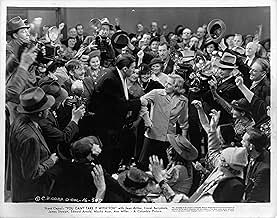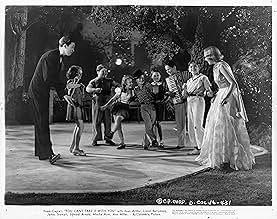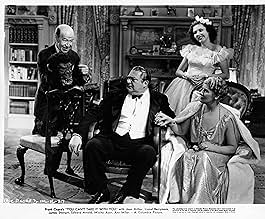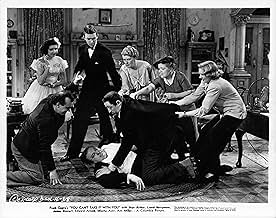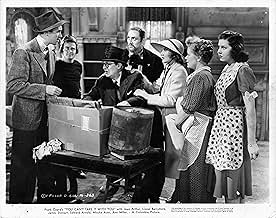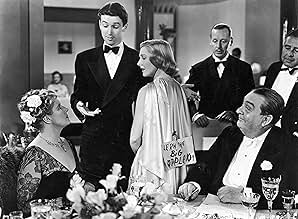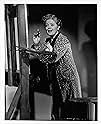अपनी भाषा में प्लॉट जोड़ेंThe son of a snobbish Wall Street banker becomes engaged to a woman from a good-natured but decidedly eccentric family not realizing that his father is trying to force her family from their ... सभी पढ़ेंThe son of a snobbish Wall Street banker becomes engaged to a woman from a good-natured but decidedly eccentric family not realizing that his father is trying to force her family from their home for a real estate development.The son of a snobbish Wall Street banker becomes engaged to a woman from a good-natured but decidedly eccentric family not realizing that his father is trying to force her family from their home for a real estate development.
- निर्देशक
- लेखक
- स्टार
- 2 ऑस्कर जीते
- 6 जीत और कुल 7 नामांकन
- Donald
- (as Eddie Anderson)
फ़ीचर्ड समीक्षाएं
My Rate:1000 Out Of 10
First of all, the story-telling is flawless. It very cleverly sets up the two very different families, the Vanderhof/Sycamores (an offbeat family trading most importantly in happiness) and the Kirbys (a stiff up tight banking family trading mostly in weapons). To complete the biggest deal of his career, Anthony Kirby Sr (Edward Arnold) must buy up the last house in a neighbourhood, and of course, this house belongs to Martin Vanderhof (a delightful Lionel Barrymore). The movie pleasantly surprised me in *not* having young Tony Kirby (James Stewart) be assigned to get Vanderhof to sell his house and thereby falling in love with Alice Sycamore (Jean Arthur) and her zany family. Rather, he was in love with her to begin with, and loved her regardless of what he thought of her family. (Though it would be impossible to hate any of them, I feel!) The story really is simple: Tony loves Alice no matter what, and doesn't want her or her family to put on a show to impress his own family. When he surprises her by turning up a day early for a dinner engagement, the Kirbys meet the Vanderhof/Sycamores for who they truly are, wind up in jail, and along the way, learn a little bit about being real human beings.
There are several delightful scenes in the film as well, all beautifully filmed and connected such that the story is a coherent whole. I'm especially partial to practically any scene with James Stewart wooing Jean Arthur (those two, quite seriously, make the cutest couple imaginable)--I love it when he sort of proposes to her. "Scratch hard enough and you'll find a proposal." Or that lovely intimate scene in the park where he directs her to a seat like he would at the ballet, or when they start dancing with the neighbourhood children. The scene in the restaurant was also amusing, when Tony kept warning Alice that there was a scream on the way, building it up so perfectly that *she* wound up screaming before he did. It's hard to beat the scene in night court too, when Capra foreshadows pretty much the exact same scene and sentiment in the forthcoming IT'S A WONDERFUL LIFE, when all of Vanderhof's friends chip in to pay off his fine. It's sweet, it's real, and it's something you really do wish could still happen in this world. Even the littlest things like Grandpa Vanderhof's dinnertime prayers are enough to remind the viewer of what a world could be like if we kept our values simple, our wants satisfied, and ourselves happy.
Second of all, the acting is superlative. How could it *not* be, with a cast like this? Evidently I was completely charmed by James Stewart and Jean Arthur, who are both incredibly believable both as real people and movie stars, and who together make Tony and Alice an utterly credible, true-to-life couple. Edward Arnold was great as the stuffed shirt Anthony Kirby Sr too--his eventual 'thawing' was something that could easily have been played in too exaggerated a fashion, but both the actor and director, I suspect, are too good to have allowed that to happen. I also had great fun watching Ann Miller in her secondary role as Essie Sycamore, Alice's dancing sister. I sincerely hope that every person making this film had just as much fun as I did watching it, because the whole secondary cast was excellent, and I loved all the characters we were introduced to, particularly the entire Sycamore family with their attendant friends (the ex-iceman DePinna, or the toymaker Poppins) and even their servants Rheba and Donald, who were treated almost as much as part of the family as could be expected at that time. But my greatest praise would have to be reserved for Lionel Barrymore as Martin Vanderhof--a sweeter, lovelier old man you just couldn't imagine, and a complete change from his much-better-known Mr. Potter in IT'S A WONDERFUL LIFE. He really does make Grandpa Vanderhof very much a real person, from his reminiscences about Grandma Vanderhof, to his messing around with the IRS agent, to his harmonica-playing and evident love of life and people.
I really could not say enough good things about this movie (which I prefer to IT'S A WONDERFUL LIFE). It'll make you laugh, it'll make you cry, and quite frankly, it'll make you glad to be alive. Not many movies can do that. And it's most certainly true that you can't take your money with you... but what you *can* do is take this movie and its message to heart. 10/10, without a doubt.
Stewart comes from a rich and completely uptight family. Miss Arthur is the only relatively sane member of a very wild family. Lionel Barrymore is wonderful as the grandfather here. He is so warm and funny in this movie, it's hard to believe he's the same man who played the evil Mr. Potter in It's A Wonderful Life. Edward Arnold who was known for playing slimy villians, is great as Stewart's very wealthy and totally stuck-up father.
Barrymore is in the role of the good guy, the one who's figured out that material things are less important than having friends and enjoying life. He also understands that you've got to let people be free to explore themselves, and be who they are. He has a charming scene early on with Arthur, listening to her describe her new love, and reminiscing about his deceased wife. He's also the voice of reason about extremism in the world, commenting that everybody was running out to 'get an ism' to solve their problems, e.g. communism or fascism, as opposed to sticking to the principles of America. "With malice toward none and charity to all," he quotes Lincoln, "Nowadays they say think the way I do or I'll bomb the daylights out of you." It's a wonderful character, and well played by Barrymore.
Jimmy Stewart and Jean Arthur are endearing in their roles as well, and they also turn in very good performances. Watch Arthur's small facial reactions in the aforementioned scene with Barrymore, and later when she's with Stewart when he's clowning around in the restaurant and threatening to scream. The idea that the innovation Stewart's character wants to pursue harvesting energy from the sun's rays like plants really made me smile, seeing as this type of green energy sounded so crazy in 1938. The film isn't bullish on the idea per se, but it gets across the point that it's better to have the courage to follow one's dreams, than it is to bury them in a hum-drum existence.
There is a joy to the film in this house that Barrymore runs, with inventors in the basement letting off firecrackers, Jean Arthur sliding down the bannister, and her sister (Ann Miller) twirling around to her ballet instructor's direction. On the night Stewart decides to drop in on them as a surprise so that his family can see Arthur's in a true light, Miller is dancing about, Barrymore is tossing darts, his daughter (Spring Byington) is working on an awful old painting of hers with one of the guys posing as a Roman discus thrower, and the servants are dancing delightfully in the kitchen. Everyone is simply being themselves. No one cares how good they are, or exactly how they'll monetize what they're doing. They simply do what they want to do, and have fun at it, letting the money sort itself out in some mysterious way that isn't immediately apparent to us.
A lot is made of director Frank Capra's idealism, which may seem naïve to the modern viewer. It's true that this is movie of hope and optimism, but at the same time, Capra was clear-eyed about what was happening in the world. When Barrymore asks the Russian ballet teacher (Mischa Auer) "Did you bring me any Russian stamps?," the latter replies "No, nobody writes to me, they're all dead," which considering Stalin's purges in 1937-38 is a chilling comment slipped in to the script. Capra also recognized the danger of a climate of fear, and through Arthur's character (actually quoting Barrymore's), says that he has a special aversion to those "the people who commercialize on fear, to sell you something you don't need." He's also spot on when it comes to satirizing the ultra-wealthy, and pointing out how unfair the world is when the wealth gap is so large. Edward Arnold's character buys influence in Washington and has a squadron of lawyers and yes-men to help him push his weight around. On the personal side he turns up his nose at the idea of eating humble fare, and his wife (Mary Forbes) haughtily looks down on everyone. As he's about to explain to a bunch of guys in jail how unemployment is "an emotional problem", he tosses a cigar away and a horde of them go after it, which is such a perfect metaphor. Capra was a beacon in the darkness, and with his ability to deliver such stirring social messages in delightful movies - making them work on both levels - he should be considered a genius.
On the other hand, it's interesting that Barrymore's character has such a casual attitude about money, I mean, one does need to be able to eat. It's a little disturbing that when an IRS agent calls on him, he admits that he's never paid income tax because he "doesn't believe in it." He then goes on to ask where all those dollars go, ridiculing the idea that America needs battleships since they haven't been used since the Spanish-American War (hmmm not so prescient in that comment), and not seeing the irony in the fact that his own servants are "on relief." He'll later say that he was just joking about all this, that he doesn't owe the government a dime, but I just thought this smacked of such backwardness, and counter to all of the programs FDR started that were helping Americans. Later we find out that he was once an executive himself, until one day "it struck me that I wasn't having any fun." I admire the sentiment to prioritize life over amassing a fortune since, after all, you can't take it with you, but it seems a little tone deaf to not recognize the need for some amount of wealth to have this luxury.
There are lots of parallels to 'It's a Wonderful Life', including the rich industrialist who has lost his sense of values and is poor in the more important ways in life, the 'little guy' who resists his plans for a monopoly by not selling out to him, and a spontaneous cash collection from friends when one is in trouble. In addition the obvious actors in both films, you'll also find Papa Bailey (Samuel S. Hinds) here, as well as the same raven (Jimmy the raven), who apparently had quite the filmography and collaboration with Capra. In this case Stewart is the scion of the industrialist, not the little guy, and he ultimately quits his dad's company to pursue his own dream, as opposed to finding himself forced to stick around at the ol' Building and Loan. The biggest difference, however is that this film imagines that rich men have souls, and that there is a place deep within that can be reached through friendly overtures and some harmonica music. Perhaps recognizing this was idealistic even by his own standards, it's notable that eight years later, that wasn't the case with Mr. Potter, who was never reached.
The madcap adventures of a crazy family during the depression is a life affirming film that shows us that money isn't everything and that yes, you can't take it with you.
One of the joys of this film is the cast Lionel Barrymore, Jimmy Stewart, Ann Miller, Dub Taylor, Edward Arnold, Eddie Rochester Anderson, Misha Auer and just about every great supporting actor and actress under the sun, all acting completely and wonderfully mad. They sell the story and make you smile from ear to ear.
I can't be rational where this film is concerned.
Just see it.
You'll feel good for days.
10 out of 10.
Oscars Best Picture Winners, Ranked
Oscars Best Picture Winners, Ranked
क्या आपको पता है
- ट्रिवियाAnn Miller was only 15 years old when this movie was filmed. Her character is called on to perform numerous (amateur) ballet positions, including dancing en pointe. She had never been trained to do so, and wasn't using shoes with the proper support. She was just forcing her feet up onto their toes, which was very painful for her. She hid this from the cast and crew, but would cry (out of sight) off stage. James Stewart noticed her crying, though he didn't know why, and would have boxes of candy to make her feel better.
- गूफ़When Alice is in the courtroom, she is wearing a trench coat as newspaper photographers take pictures. In the newspaper pictures, she is not wearing the coat.
- भाव
Grandpa Martin Vanderhof: Lincoln said, "With malice toward none, with charity to all." Nowadays they say, "Think the way I do or I'll bomb the daylights outta you."
- कनेक्शनEdited into The Three Stooges Meet Hercules (1962)
- साउंडट्रैकValse Brilliante Op. 34 No 2
(1838) (uncredited)
Music by Frédéric Chopin
Played on an xylophone by Dub Taylor
टॉप पसंद
- How long is You Can't Take It with You?Alexa द्वारा संचालित
- At the time this movie was made, was there any provision for the humane treatment of animals? For example, a kitten, a bird and a dog are in several scenes with fireworks blowing up. How did they keep the animals calm during the loud noises? Did they use deaf animals? Or stuffed animals as stand-ins when the fireworks were shooting off?
- The Vanderhof family and all the others who lived in the house supposedly were devoted to having fun and being happy, but did that also apply to Rheba and Donald? They seem to be servants, but it wasn't clear if they were employees of the family or if they also just did things for fun.
विवरण
- रिलीज़ की तारीख़
- कंट्री ऑफ़ ओरिजिन
- आधिकारिक साइट
- भाषाएं
- इस रूप में भी जाना जाता है
- Vive como quieras
- फ़िल्माने की जगहें
- उत्पादन कंपनी
- IMDbPro पर और कंपनी क्रेडिट देखें
बॉक्स ऑफ़िस
- बजट
- $16,44,736(अनुमानित)
- चलने की अवधि2 घंटे 6 मिनट
- रंग
- पक्ष अनुपात
- 1.37 : 1
इस पेज में योगदान दें



